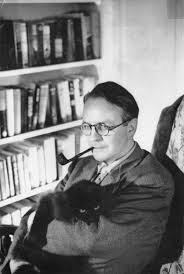My whole career is based on the idea that the formula doesn’t matter, the thing that counts is what you do with the formula; that is to say, it is a matter of style. —Raymond Chandler
I’d seen Raymond Chandler’s name, and that of his most noted creation, Philip Marlowe, around for decades before, I actually read anything from Chandler’s pen.
All I can say is that I’m glad I made Mr. Chandler’s acquaintance.
The first story I read was Chandler’s first published story, “Blackmailer’s Don’t Shoot”, back in February 2018. However, over a year passed before I picked up another Chandler story. That story was “Killer in the Rain”, which I read this past Christmas Day. I followed it up with “The Curtain” on the third of January of this year, and six days later finished The Big Sleep, which is a fix-up novel put together from “Killer” and “Curtain”.
What captured my attention and stirred my interest in Chandler is his style. Quite simply put: it is beautiful. Almost poetic, it is perhaps the most lyrical prose I’ve read. Murder mysteries elevated to the level of literary fiction.
And this is directly related to Chandler’s approach to the art of storytelling. He wasn’t overly interested in the plot. Chandler strove to give the reader interesting characters with believable behaviors, and an emotively moving atmosphere.
What HP Lovecraft emphasized as most important for supernatural horror, the atmosphere of the story, Raymond Chandler also emphasized for the murder mystery. Characters and atmosphere — not plot — carry the day.
Erle Stanley Gardner wrote that the problem with the murder mystery was the utter simplicity of the plot.
A murders B, but the police think it’s C, until the detective gets C off the hook, and pins the deed on A.
The simplicity of the murder mystery plot is undoubtedly what drove Chandler to emphasize characterization and atmosphere over plot.
When I read Chandler, I’m caught up in the mood of the story that the atmosphere produces. I’m caught up in the dilemmas of the very lifelike characters. I’m sucked into the story by the descriptions of the people and places.
Raymond Chandler was an artist using words instead of paint and brush.
As a writer, I am inspired by what he did with the written word. Chandler showed writers and continues to show writers that the most formulaic of genres can be turned into glorious art. That we writers can transcend the confines of our genres and produce not only entertainment, but timeless literature.
Comments are always welcome! And until next time, happy reading (and great writing)!
Share This!
